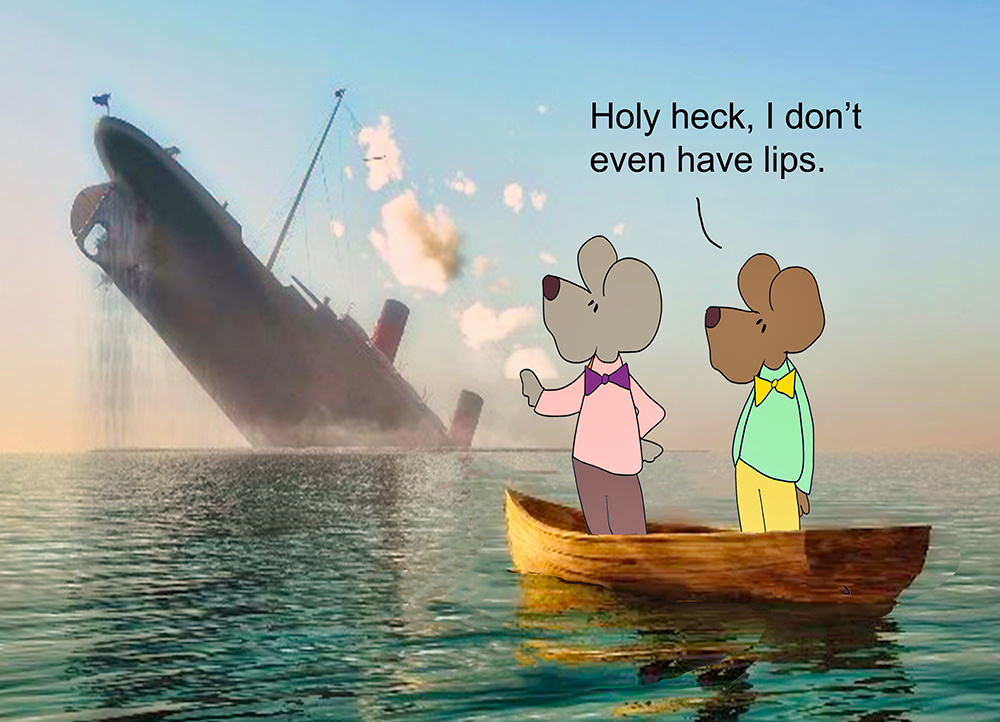Sometimes I get a word in my head, or a phrase, and it won’t leave me alone. I know this frequently happens with people when they hear a catchy tune, like the theme from Bewitched, or a Christmas jingle. They are, of course, called earworms, which is entirely gross if you ask me.
In truth, there is an actual earworm, and it is the American moth caterpillar. That caterpillar is a pest of corn, cotton, and tomatoes. They are wormy. And to imagine them in my ear is completely spine-tingly gross.
But I have digressed in a big wide swing, which is my MO. You know, the short version of modus operandi, an expression directly from Latin meaning “way of operating.” Modus operandi was first recorded in English by the 1650s. And there. I did it again.
Let’s get back to the phrase in my head. All week long, I have been hearing, over and over again:
“Loose lips sink ships.” I knew roughly what it means, but still, I had to look it up for its clear intention.
“Loose lips sink ships” is an American English idiom meaning “beware of unguarded talk.” The phrase originated on propaganda posters during World War II, often showing a large ship, sinking and burning in the deep dark waters. The phrase was created by the War Advertising Council and it was used on posters by the United States Office of War Information.
Propaganda is due for a definition, as we sure are hearing it a lot during our current time. Propaganda is “information, especially of a biased or misleading nature, used to promote or publicize a particular political cause or point of view.” (Dictionary). Just so we know.
The “loose lips” posters were part of a general campaign of American propaganda during World War II. Its purpose was to “advise” servicemen and other citizens of avoiding careless talk that might undermine the war effort. In other words, if you don’t have something good to say about the war effort, don’t say anything at all.
There were a lot of other slogans floating around that were similar. But, “Loose lips sink ships” was the phrase that stuck around for the remainder of the century. It became an admonition to avoid careless talk in general.
Different countries had different slogans at the time. The Brits would say “Careless Talk Costs Lives.” Or, just plain old, “Keep Mum.” Good old Sweden took a different turn with “En Svensk tiger” which means “A Swede keeps silent. In their language, tiger and silent are the same word. But what about the Germans? Leave it to them. Germany used “Schäm Dich, Schwätzer!” which translates to “Shame on you, blabbermouth!”
I’m am going to use Scham Dich, Schwatzer, all over Facebook today.
But this phrase has been the center of some arguments among propaganda experts and historians. The government claimed these were put in place to dissuade the German espionage effort during WWII. The other side argued that the purpose of the wartime posters, the propaganda, and even the censorship of soldiers’ letters, was not to divert spies but “to clamp as tight a lid as possible on rumors that might lead to discouragement, frustration, strikes, or anything that would cut back military production.” (Fro the book: Made to Stick: Why Some Ideas Survive and Others Die)
And that is the thing about propaganda. The side using it, normally claims the content is patriotic, and anyone doubting those words is nothing less than un-American. (Or fill in the name of your country here.). The sad part about seeing so much propaganda today? Because, normally, the influx of propaganda comes in times of war. And the truth is, our nation has been at war within itself, for the past four years, with the guidance, and encouragement of the president. He has purposefully pitched Americans against one another.
I see our ship sinking, and President Trump is the captain right now.
No loose lips are required to speak that truth.
==========
“Here is your country. Cherish these natural wonders, cherish the natural resources, cherish the history and romance as a sacred heritage, for your children and your children’s children. Do not let selfish men or greedy interests skin your country of its beauty, its riches or its romance.”
― Theodore Roosevelt
==========
“Every miserable fool who has nothing at all of which he can be proud, adopts as a last resource pride in the nation to which he belongs; he is ready and happy to defend all its faults and follies tooth and nail, thus reimbursing himself for his own inferiority.”
― Arthur Schopenhauer, Essays and Aphorisms
==========
“The greatest patriotism is to tell your country when it is behaving dishonorably, foolishly, viciously.”
― Julian Barnes, Flaubert’s Parrot
==========
And what do loose lips do? Let that sink in.
